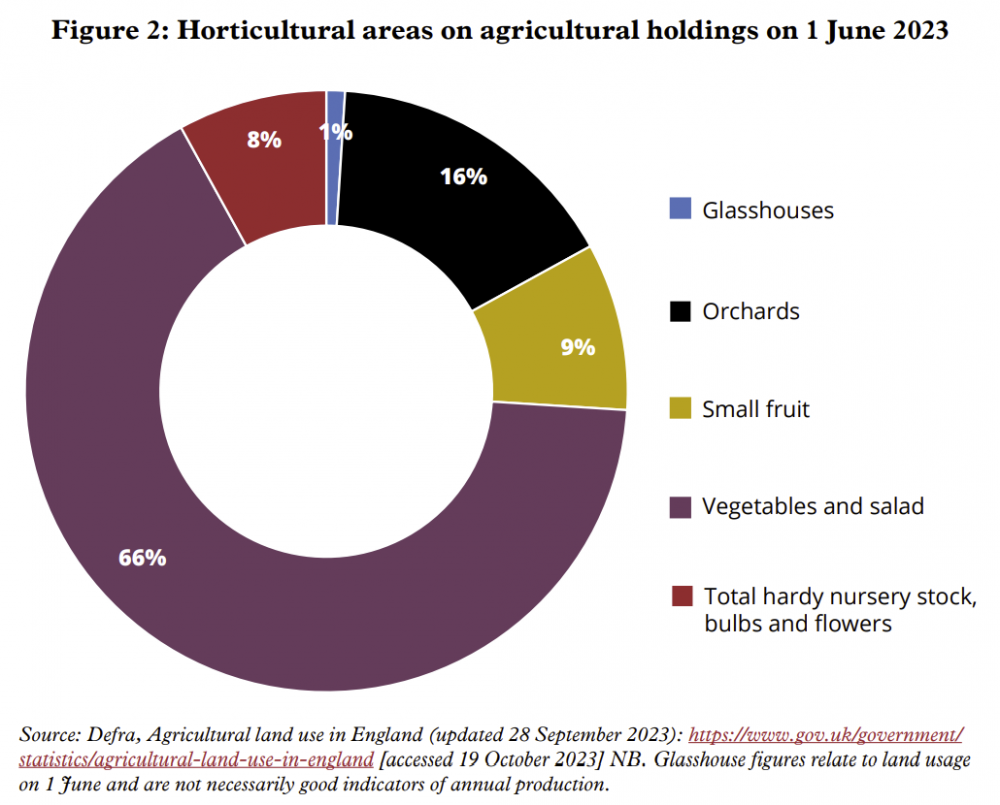This Forum will close on Wednesday 27 March, 2024. Please refer to the announcement on the Discussions page for further detail.
Sowing the seeds: A blooming English horticultural sector
 Athelas
Posts: 946
Athelas
Posts: 946
Just read an interesting report on horticulture in England from a committee of the House of Lords (6 Nov 2023): https://committees.parliament.uk/publications/41921/documents/208546/default
It covers a wide range of topics – a few snippets below:

It covers a wide range of topics – a few snippets below:
- In England, agriculture accounts for 63.1% of land use; ~5% of land use is classed as private residential gardens
- The “perfect storm” of global and domestic challenges has put further pressure on the horticultural sector, e.g., Brexit, COVID-19, war in Ukraine with effects on energy and fertiliser costs
- Reliance on imports with availability of cheaper overseas labour as a driver; a UK farm worker would be expected to earn around £70.70 for a seven-hour day; in Morocco a worker growing tomatoes would earn around £5.50 per day
- In 2022, the UK imported ornamental plants at a value of £1.5 billion, a 22% increase on 2021
- In 2022, the UK imported vegetables at a value of £2.7 billion, a 15% increase on 2021; top countries by imports were Spain, the Netherlands, France, Morocco and Kenya
- From the time children enter school, the National Curriculum fails to give them a good basic knowledge of horticulture and horticultural skills... Horticulture should be put on the curriculum as a stand-alone topic within the science curriculum at all Key Stages

Cambridgeshire, UK
2
Posts
i can’t see much point in teaching children though, when they grow up most of it will be automated.
UK young people just won’t work on farms now, it will be less so when the next generation grow up.
A farmer not far from us takes on Eastern European seasonal workers, they have to show they’re advertising for UK workers as well, he said of the 37 UK workers he took on, only one was left at the end of the shift, whereas the EU workers can earn up to £100.00 a day which is a lot of money in their own country, one young chap 23 years old, said he owns two houses now in his own country.
They have nice accommodation, mobile homes, rent free I think.
We didn't see maths removed from the curriculum in the 70's when the pocket calculator was launched.
Education isn't focused purely on industry and careers. There's much that is taught that is key to peoples understanding of the world around us. Its these key skills that help to make us functioning members of society.
With regards to automation, a system like this would still require knowledge input. Automation is pretty good at carrying out pre programmed tasks, and perhaps being reactive to certain variables but ultimately its task is to make humans lives easier, not replace them altogether.
In any case whilst farming is a large part of the 'horticulture' industry its pretty black and white and not all that complex when compared to other parts of the industry. Farming is ripe for automation, but other areas perhaps less so. (Edit - knowing three farmers locally i really don't consider them horticulturalists in the slightest. They're land managers really...and i doubt they would mind me saying that!)
It worth bearing in mind that probably 90% of the folk on here that engage in horticultural activities do so in a private setting i.e. their gardens. The opportunity to be educated at a young age in one of the nations most popular pastimes should be enthusiastically encouraged in my opinion.
The sowing of seeds, potting on of seedlings and cuttings is highly automated in Dutch and Belgian horticulture for mass produced veggies and plants for horticulture but we will always need humans capable of multiplying non bog standard varieties as well as crossing plants to select new varieties and strains to cope with both climate change and human desire for novelty.